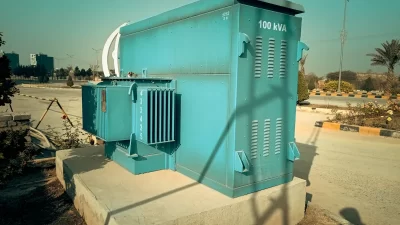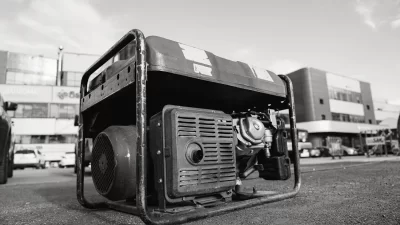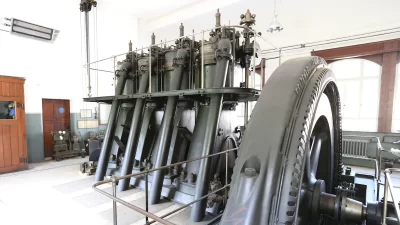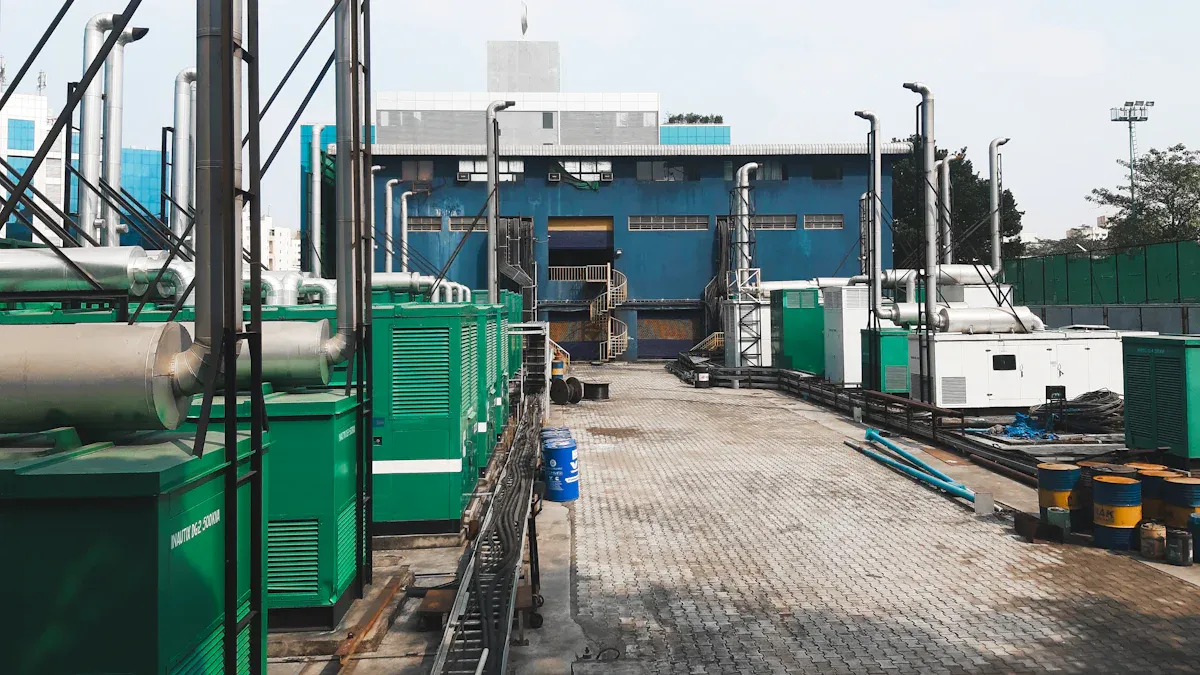
You can find wholesale used generators from top brands in almost any wattage you need. If you run a business, handle construction jobs, or manage a facility, you want power solutions that work without breaking the bank. Well-maintained emergency diesel generators have a 20% chance of failure within two weeks, while poorly maintained ones jump to 50% in just 48 hours, as shown below:
Maintenance Level | Failure Probability | Time Frame |
|---|---|---|
Well-maintained EDGs | 20% | Within two weeks |
Poorly maintained EDGs | 50% | Within 48 hours |
When you combine used generators with solar panels and batteries, you can cut life cycle costs by up to 35% and boost reliability. This means you save money and avoid costly outages.
Key Takeaways
Buying used generators in bulk saves money and ensures steady power supply for multiple sites.
Choose a generator wattage that matches your power needs with extra capacity to avoid overloads.
Top brands like Cummins, Caterpillar, and Generac offer reliable used generators for various uses.
Regular maintenance and operating generators at 50% to 80% load extend their life and save fuel.
Select suppliers who provide warranties, fast delivery, and strong customer support for peace of mind.
Used Generators Overview
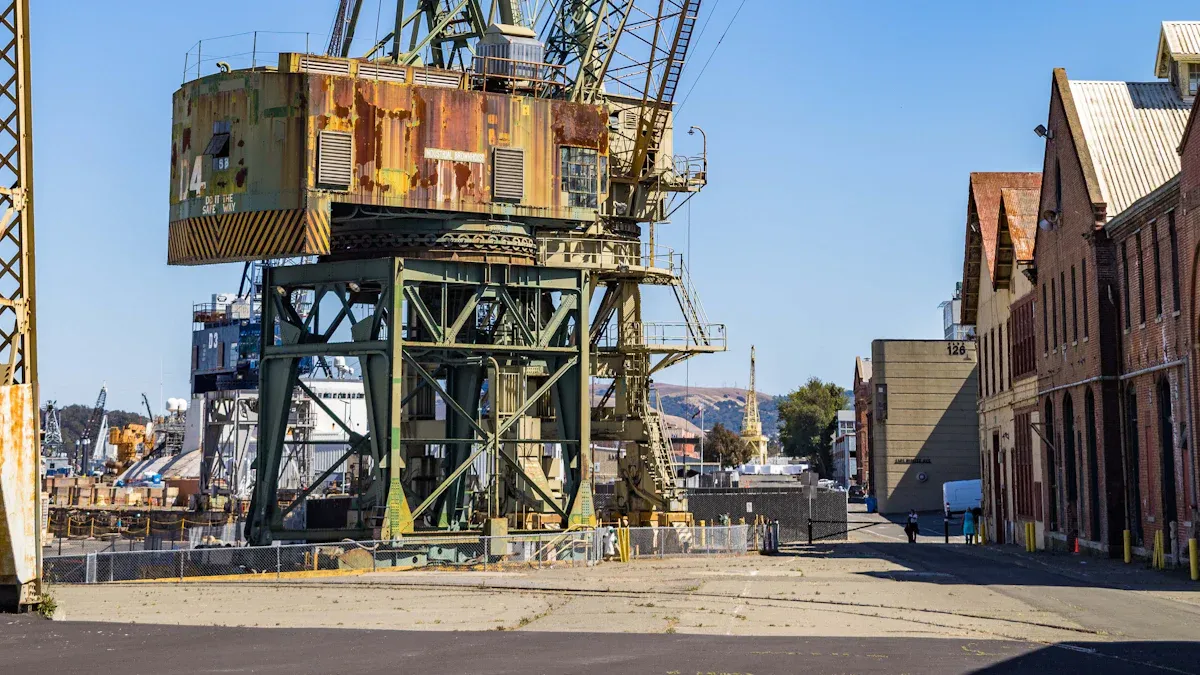
What Are Used Generators
Used generators give you reliable power without the high price tag of new equipment. These machines have already served in other settings, but with proper maintenance, they can deliver strong performance for years. You can find them in many sizes and types, from portable units to large industrial models. Most used generators run best at 70% to 80% of their rated capacity. This range helps you save fuel, reduce wear, and extend the generator’s life.
Here’s a quick look at common specs you might see:
Specification | Typical Value or Example |
|---|---|
Power Ratings | kW, kVA |
Power Factor | 0.8 |
Engine Horsepower | 1490 HP (e.g., Cummins QST30-G5) |
Voltage | 277/480V |
Phase | 3-Phase |
Frequency | 60 Hz |
Fuel Tank Capacity | 2,400 Gallons |
You should always check the model number and specs to match your needs.
Bulk Purchase Benefits
When you buy used generators in bulk, you unlock big savings. Suppliers often offer discounts for large orders, so you pay less per unit. You also get a steady supply of backup power for multiple sites or projects. Bulk buying makes sense if you manage several locations or need to keep spare units on hand. You can also mix and match different wattages and brands to fit each job. Regular maintenance and smart load management help you get the most value from your investment.
Tip: Operating your generators within the optimal load range not only saves fuel but also cuts down on mechanical problems.
Common Applications
You can use used generators in many ways. Businesses rely on them for backup power during outages. Construction crews use them to run tools and lights on job sites. Farmers keep their operations running during storms or grid failures. Homeowners use portable models for camping, tailgating, or emergency power. The market shows a growing demand for compact, fuel-efficient, and hybrid generators. Many people now look for models with smart features, like remote monitoring or eco-friendly options. No matter your need, you can find a used generator that fits.
Brands
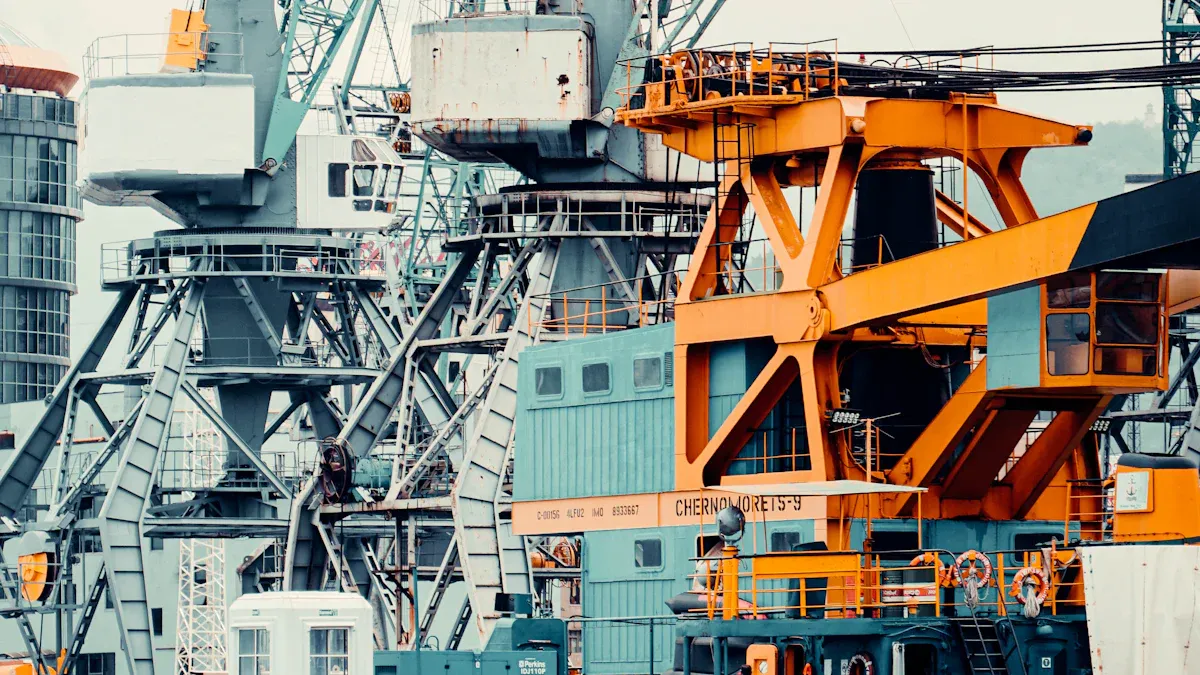
Leading Brands
When you shop for generators, you want brands you can trust. Some names stand out because they have proven themselves in tough jobs and emergencies. Here are the top brands you will see when looking for used generators:
Cummins
Caterpillar
Generac
Multiquip
Wacker Neuson
MQ Power
Fermont
These companies have built strong reputations by making reliable machines that work in many settings. Industry reports show that Cummins, Caterpillar, and Generac lead the emergency power generator market. They focus on quality, performance, and solutions that fit your needs. The market for emergency power generators is growing fast, with more people needing backup power for homes, businesses, and job sites. This growth pushes brands to keep improving their products.
Tip: Choosing a well-known brand can make it easier to find parts, service, and support when you need it.
Brand Features
Each brand brings something special to the table. You might want a generator that runs quietly, lasts a long time, or is easy to move. Here’s a quick look at what sets these brands apart:
Brand | What Makes It Stand Out |
|---|---|
Cummins | Heavy-duty build, advanced engineering, multi-fuel options, strong for data centers and hospitals |
Caterpillar | Large selection, reliable for commercial and industrial use, new models with EPA certification |
Generac | Affordable, user-friendly, eco-friendly, remote monitoring, great for homes and small businesses |
Multiquip | Compact, portable, trusted on construction sites, easy to transport |
Wacker Neuson | Rugged, built for tough job sites, good for construction and outdoor events |
MQ Power | High-output, trailer-mounted options, popular for rental and industrial use |
Fermont | Military-grade, designed for extreme conditions, long-lasting |
Durostar | Portable, quiet operation (under 70 decibels), EPA approved, easy to move with wheels and handles |
Let’s break down some of the top brands even more:
Cummins generators come in many sizes, from 15 to 3,750 kVA for diesel and 13 to 2,000 kW for natural gas. You often see them in hospitals and data centers because they run efficiently and last a long time. They use advanced technology to keep emissions low and performance high.
Caterpillar offers models from 20 kW to 2,250 kW. You can count on them for big jobs, like powering factories or large buildings. Caterpillar keeps updating its products, like the Cat® G3412 natural gas generator, which meets strict EPA rules.
Generac covers a wide range, from small 1 kVA units up to huge 17,550 kVA machines. People like Generac for its easy controls, remote monitoring, and affordable prices. You can use them at home, on a job site, or for rental needs.
Durostar focuses on portable generators. These units are quiet, easy to move, and work well for camping or small jobs. Durostar does not make inverter or standby generators, but its portable models are popular for their power and user-friendly design.
Here’s a quick comparison between Generac and Cummins:
Feature / Brand | Generac | Cummins |
|---|---|---|
Reputation | Innovative, affordable, user-friendly | Durable, advanced, premium quality |
Engine Design | Variable speed, fuel efficient, quiet | Heavy-duty, long life, low emissions |
Fuel Options | Dual fuel, long run time | Multi-fuel, fuel efficient |
Noise Levels | Quiet-Test mode, low RPM | Sound-attenuated, quiet for neighborhoods |
Remote Monitoring | Mobile Link app | Connect Cloud platform, mobile app |
Weather Resistance | Corrosion-resistant enclosures | Heavy-duty, weather-resistant |
Installation & Maintenance | Easy install, accessible parts | Easy install, minimal maintenance |
Support & Warranty | Big dealer network, strong warranty | Strong service, competitive warranty |
Price Range (Residential) | $2,000–$5,000 | $3,000–$6,000 |
Price Range (Commercial) | Up to $10,000+ | Up to $10,000+ |
You can see that Generac focuses on making things simple and affordable, while Cummins aims for top performance and durability. Caterpillar stands out for its wide selection and trusted name in big projects. Multiquip and MQ Power are favorites for portable and trailer-mounted units. Wacker Neuson and Fermont are known for rugged builds that handle tough conditions.
When you choose used generators from these brands, you get machines that have already proven themselves. You can match the brand to your needs, whether you want something portable, quiet, or built for heavy-duty work.
Wattages
Wattage Range
When you look at generators, you’ll see a huge range of wattages. Some are small enough to carry with one hand. Others need a trailer just to move them. You can find portable models that start at about 10 kVA. These work well for camping, tailgating, or powering a few tools. If you need more power, medium-sized generators go from 100 kVA up to 350 kVA. These can handle small businesses, construction sites, or backup for a small office.
For bigger jobs, large commercial generators run from 350 kVA to 1,000 kVA. These units keep hospitals, data centers, and factories running when the power goes out. If you manage a big operation, you might need industrial-scale generators. These start at 1,000 kVA and can reach over 100,000 watts. They power mining sites, oil rigs, and city utilities.
Here’s a quick table to help you see the wattage categories:
Voltage Rating Category | Wattage Range Description |
|---|---|
Below 100 kVA | Small portable generators |
100 kVA to 350 kVA | Medium-sized generators |
350 kVA to 1000 kVA | Large commercial generators |
Above 1,000 kVA | Industrial scale generators |
You’ll also find different types of generators with their own power limits:
Generator Type | Maximum Power Output |
|---|---|
Diesel Generators | Up to 1375 kVA (mobile) |
Spark Ignited | Up to 1175 kVA (mobile) |
Standby Diesel | Up to 2000 kW |
Standby Spark Ignited | Up to 1000 kW |
Trailer-mounted and high-output models are popular for jobs that need lots of power but also need to move from place to place. For example, you might see a 220 kW or 300 kW generator on a construction site or at a big event. These models are easy to transport and set up fast.
Here’s a look at some common trailer-mounted models:
Generator Model | Power Output Range (kW) | Description |
|---|---|---|
XQP200 | ~220 kW | Trailer-mounted/mobile generator |
XQ230 Tier 4 Final | ~230 kW | Trailer-mounted/mobile generator |
XQP300 | ~300 kW | Trailer-mounted/mobile generator |
XQP310 | ~310 kW | Trailer-mounted/mobile generator |
Additional models | Various (up to 1900+ kW) | Mobile generator sets with specs |
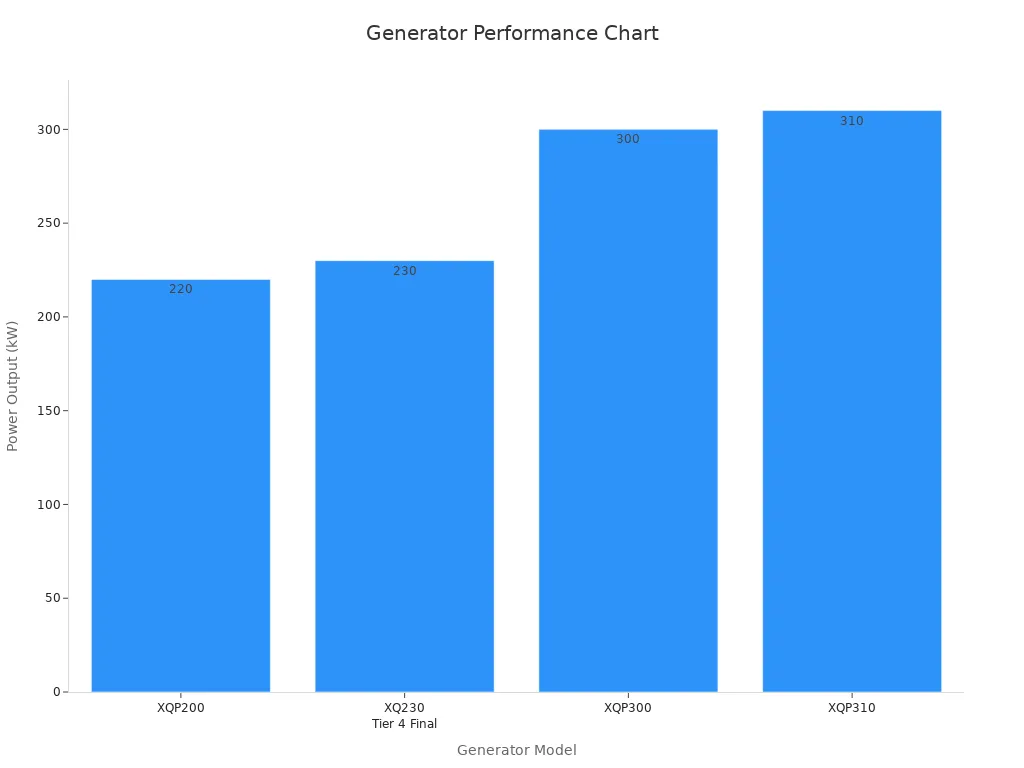
Note: Trailer-mounted generators give you flexibility. You can move them wherever you need power, whether it’s a festival, a job site, or an emergency.
Matching Wattage to Needs
Choosing the right wattage is all about knowing what you need to power. If you pick a generator that’s too small, you risk overloading it. If you go too big, you might waste fuel and money. Let’s break down how different wattage ranges fit real-world jobs.
Wattage Range (kW) | Typical Operational Settings / Industries | Energy Needs Description |
|---|---|---|
75 – 100 | Small construction sites, small offices | Powering light machinery, lighting, and basic office equipment |
150 – 250 | Medium construction sites, hospitals | Supporting critical medical equipment, HVAC, moderate machinery |
300 – 500 | Data centers, larger hospitals | Maintaining servers, cooling systems, life support systems |
600 – 1000 | Mining operations, large industrial sites | Powering heavy drills, pumps, ventilation, processing equipment |
1500 – 3000 | Oil & gas facilities, municipal utilities | Supporting rigs, plants, emergency services, infrastructure |
You can match your generator to your needs by thinking about what you want to keep running. For example:
Construction sites need enough power for heavy machinery, lights, and on-site offices.
Hospitals rely on backup power for life support, imaging machines, and air conditioning.
Data centers must keep servers and cooling systems running at all times.
Mining operations use generators for drills, pumps, and air systems.
Oil and gas companies need high-output units for rigs and processing plants.
Municipalities use large generators for water treatment, emergency services, and public utilities.
Telecom companies back up cell towers and communication hubs.
Rental companies offer generators for events, construction, or emergencies.
You’ll see that the right wattage depends on your industry and your specific needs. If you run a small office, a 100 kW generator might be enough. If you manage a hospital or a factory, you’ll want something much bigger.
The market for generators keeps changing. Portable models under 3 kW are still very popular for homes and outdoor use. More people want backup power because of storms and old power lines. New technology, like inverter and hybrid generators, makes units quieter and more efficient. Construction and industrial jobs drive demand for bigger, high-wattage models. In North America, people buy more generators because of bad weather and remote work. In Asia, fast-growing cities and frequent power cuts push demand higher. Europe focuses on cleaner, more efficient models. Other regions need generators because of unstable power grids.
Tip: Always check the total wattage of everything you want to power. Add up the numbers, then choose a generator with a little extra capacity. This helps you avoid overloads and keeps your equipment safe.
Choosing Generators
Assessing Power Needs
Before you pick a generator, you need to know how much power you really use. Start by making a list of everything you want to run. This could be lights, computers, refrigerators, or heavy equipment. Each device has a label that shows how many watts it uses. Some machines, like air conditioners or pumps, need extra power to start up. This is called surge or starting wattage.
Here’s a simple way to figure out your total power needs:
Write down all the equipment you want to power.
Find the running wattage and starting wattage for each item. You can check the labels or manuals.
Add up the running watts for all devices.
Find the highest starting wattage and add it to your total running watts.
Choose a generator with at least 10% more capacity than your total. This gives you room for future needs and keeps your generator running smoothly.
Tip: Generators work best when you use them at 50% to 80% of their rated power. This helps them last longer and saves fuel.
Brand Selection
Not all generator brands are the same. Some focus on heavy-duty jobs, while others make portable models for quick use. Think about what matters most to you. Do you want something quiet? Do you need a machine that can handle tough weather? Maybe you want easy access to parts and service.
Cummins and Caterpillar are great for big jobs and long-term use.
Generac is popular for homes and small businesses.
Multiquip and Wacker Neuson are favorites on construction sites.
Durostar works well if you want something portable and quiet.
Pick a brand that matches your needs and makes it easy to get help if you need repairs.
Budget and Reliability
Your budget matters, but so does reliability. Sometimes, spending a little more upfront saves you money later. Look for generators that have a good track record and are easy to maintain. Ask about warranties and support services. If you buy in bulk, you can often get a better price per unit.
Factor | What to Consider |
|---|---|
Price | Upfront cost, bulk discounts |
Reliability | Brand reputation, service life |
Maintenance | Ease of finding parts, support |
Warranty | Length and coverage |
Note: A reliable generator keeps your business running and protects you from costly downtime.
Wholesale Benefits
Cost Savings
Buying generators in bulk can save you a lot of money. When you choose wholesale, you often pay up to 50% less than you would for new equipment. Many buyers find that used generators from trusted brands cost about half the price of new ones. You also avoid long wait times, so you can keep your projects on schedule. Some resellers even offer warranties, which gives you peace of mind. Low-hour units often work just as well as new models, so you get great value for your investment.
Tip: Always check for warranty coverage and ask about the generator’s usage history. This helps you make a smart purchase and avoid surprises.
Inventory and Delivery
You want your equipment fast, especially when you have urgent needs. Wholesale suppliers know this, so they keep large inventories ready to ship. Many companies hold extra stock—sometimes up to 20% more than usual—to make sure you never face a shortage. They use advanced inventory tools to track what’s available and forecast demand. This means you can get the generators you need without long delays.
Suppliers use digital systems to manage stock and speed up delivery.
Inventory buffers help prevent stockouts and keep your business running.
Fast shipping options mean you get your order quickly, even for big jobs.
Note: Quick delivery and large inventories help you avoid downtime and keep your operations moving.
Support Services
When you buy wholesale, you get more than just equipment. Many suppliers offer support for emergency, commercial, and industrial use. You can ask for help with installation, maintenance, and repairs. Some sellers provide verification certificates and testing reports, so you know your generator is ready to go. If you ever need parts or service, you can count on a strong support network.
Service Type | What You Get |
|---|---|
Installation Help | Guidance for setup and connection |
Maintenance Support | Tips and service plans |
Warranty Options | Coverage for repairs and parts |
Emergency Response | Fast help when you need it most |
You get confidence knowing that your used generators will keep working, no matter what comes your way.
Supplier Selection
Warranty and Inspection
You want peace of mind when you buy generators. A good supplier will offer a clear warranty and a full inspection before you get your equipment. Always check what the warranty covers. Some suppliers give you coverage for parts and labor, while others only cover certain repairs. Ask about the inspection process. Reliable suppliers test each generator for defects and make sure it meets safety standards.
Here’s a quick look at how you can compare suppliers:
Category | Supplier Performance Metrics (KPIs) |
|---|---|
Quality | Defect rate, Warranty response |
Inspection | Defect type, Defect rate |
Warranty & Support | Warranty response, After-sales support |
If a supplier has a low defect rate and responds quickly to warranty claims, you know you can trust them.
Customer Service
Great customer service makes your buying experience smooth. You want a supplier who answers your questions fast and helps you solve problems. Look for companies with strong after-sales support. They should help you with setup, maintenance, and repairs. Some suppliers even offer training or guides to help you get started.
Tip: A supplier with a high response rate and good after-sales support will save you time and stress.
You can also check reviews or ask other buyers about their experiences. If a supplier is easy to reach and always ready to help, you know you’re in good hands.
Delivery Options
Getting your generators on time is important. Top suppliers use smart tools to make sure your order arrives when you need it. Here are some ways they do this:
AI predicts demand and helps place inventory closer to you.
Real-time tracking lets you see where your shipment is at any moment.
Flexible delivery options, like same-day or fixed-time delivery, fit your schedule.
AI helps plan the best routes and manage risks like traffic or weather delays.
Performance data, such as on-time delivery rates, shows how reliable a supplier is.
Note: Suppliers who use these tools can deliver faster and handle problems before they affect you.
When you choose a supplier, ask about their delivery options and how they track shipments. This helps you avoid delays and keeps your projects running smoothly.
You have many options when it comes to wholesale generators. You can find different brands, wattages, and features to match your needs. Bulk buying helps you save money and keeps your projects on track. Suppliers offer more than just equipment. You get access to engineering support, maintenance plans, and tools that help you pick the right power solution.
Diesel generators work well for backup power and last a long time.
Suppliers provide new, surplus, and used units from trusted brands.
Services like installation help and power calculators make your choice easier.
Studies show that hybrid systems with diesel generators lower costs and boost reliability. When you reach out for a quote, you get expert advice and support for your next project. Choose a supplier who stands by their products and helps you every step of the way.
FAQ
How do I know which generator size is right for me?
Start by listing everything you want to power. Add up the wattage for each item. Pick a generator with a little more power than your total. This way, you avoid overloads and keep things running smoothly.
Can I trust used generators to work well?
Yes, you can. Many used generators come from trusted brands and get tested before sale. Ask for inspection reports and check the warranty. Good suppliers make sure their generators work like new.
What maintenance do used generators need?
You should check oil levels, change filters, and run the generator regularly. Keep the unit clean and dry. Follow the brand’s manual for service tips. Regular care helps your generator last longer.
Are there delivery options for large generator orders?
Most suppliers offer fast shipping and flexible delivery. You can track your order in real time. Some even provide same-day or scheduled delivery. Ask your supplier about the best option for your location.
Do wholesale suppliers offer support after purchase?
Yes! Many suppliers help with setup, maintenance, and repairs. You can get advice, service plans, and even emergency support. Good customer service makes your experience much easier.
